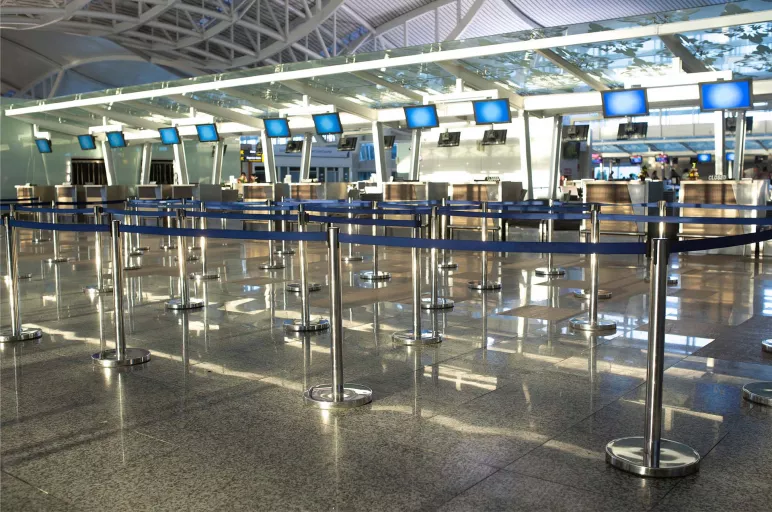
Airline Staff Strikes Deepen Supply Chain Crisis in Europe
- Strikes and staff shortages forced airlines in Europe to cancel thousands of flights at major airports in the summer.
- Labor crunch, rising fuel prices and smaller fleets have also pushed up travel costs.
- Some airports have agreed to pay ground staffers extra pay per hour during peak seasons.
October 31, 2022 | Market Intelligence 3 minutes read
After sweeping job and pay cuts when COVID-19 brought air travel to a grinding halt, staffers across the airline industry — from pilots to baggage handlers — are asking for large pay increases and better working conditions amid record inflation.
The lack of pilots has also led airlines to cancel or delay many flights. As a result, thousands of passengers have been forced to wait in nightmare queues.
Why are Airlines Struggling
A root cause of this chaos is understaffing, and this issue has been made worse by the fact that security clearances for new workers can take six to eight weeks. This has escalated the problem and increased the chaos in the already understaffed European airline industry.
European flights faced widespread disruption as a strike by French air traffic controllers forced airlines to cancel half of those scheduled to arrive or depart Paris airports and others due to having flown over France in September.
Ryanair's Spanish cabin crew union members plan to strike from Monday to Thursday every week until Jan. 7, 2023, to press for higher pay and better working conditions.
Lufthansa and its pilots' union reached a deal in a wage dispute in September averting a second strike after the first one forced the cancellation of hundreds of flights.
European airlines including Lufthansa, British Airways, EasyJet, KLM, and Wizz Air cut thousands of flights from their summer schedules to try and ease disruption, while major airports including London's Heathrow and Amsterdam's Schiphol extended caps on passenger numbers into autumn.
Schiphol has decided to reduce daily passenger numbers by 18% until at least October 31 due to labor shortages, mainly in security staff. This was expected to cut average passenger numbers through the airport to 54,500 a day for the rest of September and to 57,000 in October.
British Airways has decided to make further cancellations up to the end of October after the airport extended its cap on passenger departures. It will also reduce its winter schedule by 8%, impacting around 10,000 flights.
Airlines' problems have pushed up the prices of travel. Fuel prices are rising, staffing problems are increasing, and aircraft fleets are getting smaller. More people are taking flights, but airlines are struggling to keep up.
Airport security company ICTS, which operates at Paris' Charles de Gaulle, offered a one-off 180 euro bonus to those delaying their vacation until after Sept. 15 and 150 euros for staff who sign up new recruits, a CGT union representative said.
Some of the major airports such as Schiphol agreed to pay 15,000 cleaners, baggage handlers, and security staff 5.25 euros extra per hour during the summer. It needed to hire 500 security staff after beginning the season with around 10,000 fewer workers than before the pandemic.
Impact on Supply Chain and Procurement
Supply chain and procurement activities in the region have been severely hampered by these disruptions in the European aviation market, which have also impacted transatlantic belly capacity and air freight rates. While the demand for procurement increased over the summer, it was constrained by the sector's ability to handle the rapid development as well as the effects of the war in Ukraine.
A scarcity of drivers has already affected road transportation in Europe. Additionally, freight flows through ships were disrupted by the distinct port jams brought on by related labor strikes. Airlines were being considered as an alternative to other forms of transportation by industry participants. However, the turmoil in the airline industry has compounded the problems of procurement.
Many airlines, including FedEx, have decided to take preventive action to align themselves with rising prices and declining demand. Air cargo shipments are a key component of procurement, but industry restrictions have a significant impact on the procurement manager's ability to make decisions. In the current scenario, various category managers are avoiding making long-term commitments due to uncertainty in the market.
Author: Subodh Kapadnis
Sources and references
- businesstravelnewseurope.com/Air-Travel/Europes-aviation-recovery-reaches-critical-juncture
- trend-online.com/world-news/travel-chaos-europe/
- euronews.com/travel/2022/09/20/france-travel-the-exact-dates-to-avoid-flights-as-strike-dates-announced
- washingtonpost.com/travel/2022/09/16/france-strikes-flights-queen-funeral/
- bloomberg.com/news/articles/2022-09-07/europe-s-aviation-crisis-spurred-by-exodus-of-younger-workers



